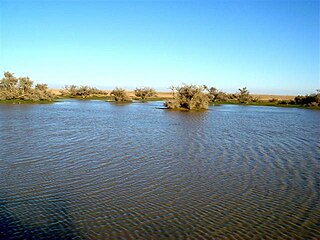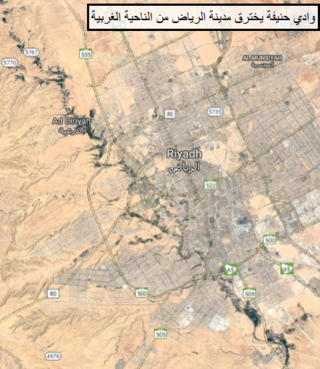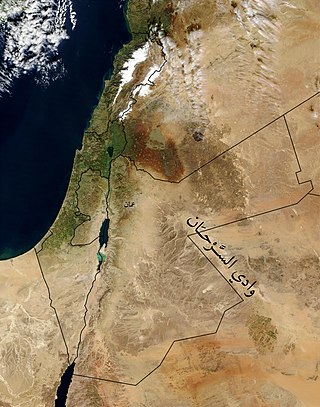
The Kingdom of Saudi Arabia is a country situated in West Asia, the largest country on the Arabian Peninsula, bordering the Persian Gulf and the Red Sea. Its extensive coastlines provide great leverage on shipping through the Persian Gulf and the Suez Canal. The kingdom occupies 80% of the Arabian Peninsula. Most of the country's boundaries with the United Arab Emirates (UAE), Oman, and the Republic of Yemen are undefined, so the exact size of the country remains unknown. The Saudi government estimate is at 2,217,949 square kilometres, while other reputable estimates vary between 2,149,690 and 2,240,000 sq. kilometres. Less than 7% of the total area is suitable for cultivation, and in the early 1960s, population distribution varied greatly among the towns of the eastern and western coastal areas, the densely populated interior oases, and the vast, almost empty deserts.

Riyadh is the capital and largest city of Saudi Arabia. It is also the capital of the Riyadh Province and the centre of the Riyadh Governorate. Located on the eastern bank of Wadi Hanifa, the current form of the metropolis largely emerged in the 1950s as an offshoot of the 18th century walled town following the dismantling of its defensive fortifications.

Najd is the central region of Saudi Arabia, in which about a third of the country's modern population resides. It is the home of the House of Saud, from which it pursued unification with Hejaz since the time of the Emirate of Diriyah.

The Hejaz railway was a narrow-gauge railway that ran from Damascus to Medina, through the Hejaz region of modern-day Saudi Arabia, with a branch line to Haifa on the Mediterranean Sea. The project was ordered by Sultan Abdul Hamid II in March 1900.

Diriyah, formerly romanized as Dereyeh and Dariyya, is a town and governorate in Saudi Arabia. Located on the northwestern outskirts of the Saudi capital, Riyadh. Diriyah was the original home of the Saudi royal family, and served as the capital of the Emirate of Diriyah under the first Saudi dynasty from 1727 to 1818. Today, the town is the seat of the Diriyah Governorate, which also includes the villages of Uyayna, Jubayla, and Al-Ammariyyah, among others—and is part of Ar Riyad Province.

The National Agricultural Development Company (Nadec) is one of the largest agricultural and food-processing share stock companies in the Middle East and North Africa. Established in 1981 by royal decree, it is a joint stock public company – 20% owned by the government of Saudi Arabia, with the rest publicly traded on the Saudi Stock Exchange. It is one of the very few and largest vertically integrated dairy businesses in the world.
Hunayn is a location in the Hijaz, Saudi Arabia, close to the city of Ta’if. It is located between Mecca and Ta’if in the Sarawat Mountains.
Al Dawasir is an Arab tribe in Saudi Arabia, Bahrain, Qatar, and other Gulf states. Its main base is in southern Najd specifically in Wadi Al-Dawasir in Saudi Arabia. The Al Dawasir tribe is among the most powerful and influential tribes of Arabia, as they are the maternal uncles of much of the House of Saud family. The Dawasir tribe is considered one of the largest Arab tribes in terms of numbers, as their number exceeds 6 million.

Wadi al-Batin is an intermittent river in Saudi Arabia, Iraq, and Kuwait. It is the lowest and final section of Wadi al-Rummah. It runs 45 mi (72 km) in a northeast–southwest direction through the Al-Dibdibah plain and has been recognized since 1913 as the border between Kuwait and Iraq.

Wadi Hanifa, historically known as Wadi al-Arad, is a wadi in the Najd region, Riyadh Province, in central Saudi Arabia. The valley runs for a length of 120 km (75 mi) from northwest to southeast, cutting through the city of Riyadh, the capital of Saudi Arabia. A string of towns and villages lie along the valley, including Uyaynah, Irqah and Diriyah. The historical city of Riyadh itself is on the northeastern side of the wadi, but the city has now expanded across Wadi Hanifa, with the sub-municipalities of Al-Shifa and Al-Urayja on its southwestern side.

Saudi Arabian cuisine varies according to the diverse landscapes and regions of the country. The environmental, geographic, and cultural diversity within this vast area has led to a wide variety of dishes. Saudi Arabia encompasses different regions, resulting in cuisines from the Central region, Eastern, Southern and Western regions. Furthermore, Saudi Arabia's position along global trade routes has led to the introduction of various spices.
Wadi Al Dawasir is a city in Najd, Saudi Arabia, in the Dawasir valley. The region is the homeland of the tribe of Al-Dawasir, the name Dawasir derives from the Arabic word 'Dawsar', the most prominent meaning of this word is Steel Lion. The governorates had a population of 91,535 at the 2022 Census. It is divided into three main neighborhoods: Alnowaima, Alkhamaseen and Allidam.

The Hijaz Mountains (Arabic: جِبَال ٱلْحِجَاز, romanized: Jibāl al-Ḥijāz or "Hejaz Range" is a mountain range located in the Hejazi region of western Saudi Arabia. The range runs north and south along the eastern coast of the Red Sea, and can thus be treated as including the Midian Mountains, and being part of the Sarawat Mountains, broadly speaking.

Wadi Sirhan is a wide depression in the northwestern Arabian Peninsula. It runs from the Aljouf Oasis in Saudi Arabia northwestward into Jordan. It historically served as a major trade and transportation route between Syria and Arabia. From antiquity until the early 20th century, control of Wadi Sirhan was often contested by various Arab tribes. The valley is named after the Sirhan tribe which migrated there in the mid-17th century.
The geology of Saudi Arabia includes Precambrian igneous and metamorphic basement rocks, exposed across much of the country. Thick sedimentary sequences from the Phanerozoic dominate much of the country's surface and host oil.

The Royal Commission for Riyadh City (RCRC) (Arabic: الهيئة الملكية لمدينة الرياض), formerly The Arriyadh Development Authority (ARA) and The High Commission for the Development of Arriyadh, is a royal commission established in 1974 during the reign of King Faisal bin Abdulaziz which was tasked with overseeing urban, economic, social and cultural development of Riyadh, the capital of Saudi Arabia.













